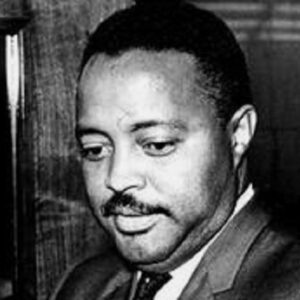American civil rights pioneer, politician, and philanthropist Hosea Williams was instrumental in the fight against segregation. Williams was raised by his grandparents after the death of his mother, who was born to blind African-American parents in Georgia. Williams pursued various jobs for several years after leaving home at age 14 before entering the United States Army during the Second World War. Upon his return, he completed high school and got both an undergraduate and graduate degree in chemistry. Subsequently, he started working for the United States Department of Agriculture in Georgia and joined the National Association for the Advancement of Colored People (NAACP). This was the beginning of his involvement with the Civil Rights movement, after which he became recognized for his anti-segregation lectures. Williams later joined the Southern Christian Leadership Conference (SCLC) and was persuaded to serve on Martin Luther King Jr.’s staff. Williams was an active participant in the Freedom Summer voter registration drive and later led the Selma-to-Montgomery protest march that was attacked by mounted police on “Bloody Sunday.” Williams became the executive director of the SCLC after King’s killing and later drifted toward politics. In 1987, he led the greatest civil rights march in the history of Georgia into the all-white county of Forsyth, resulting in a violent crash. He was a devoted activist who served the disadvantaged till his death from cancer.
Youth and Early Life
Hosea Lorenzo Williams was born in Attapulgus, Georgia, on January 5, 1926, to adolescent parents who were enrolled in a trade school for the blind in Macon. When her mother discovered her pregnancy, she fled the institute.
Williams’ mother passed away at the age of 10 due to problems with the delivery of her second child. After that, their maternal grandparents, Lela and Turner Williams, reared the two children.
Williams was forced to leave home at the age of 14 to prevent being hanged over an alleged affair with a white girl. Following three years of menial labor in Florida, he was drafted into the U.S. Army during the Second World War.
He ascended to the rank of Staff Sergeant while serving in an all-black battalion under General George S. Patton during the war. Williams spent a year rehabilitating in a military hospital in Europe after being seriously wounded in war, but was left with a chronic limp.
Williams completed high school and then attended Atlanta’s Morris Brown College after returning from the war. After earning a bachelor’s degree in chemistry, he attended Atlanta University to acquire a master’s degree.
Hosea Williams’s Career
Williams began working as a research chemist for the U.S. Department of Agriculture in Savannah, Georgia, at the beginning of the 1950s, a position he held until 1963. In the meanwhile, he was ordained as a minister as well.
Williams initially became involved in the civil rights movement in 1952, while working as a chemist, when he joined the National Association for the Advancement of Colored People (NAACP).
Williams joined the Southern Christian Leadership Conference (SCLC) in the early 1960s and became one of Martin Luther King Jr.’s most trusted officers. As an influential member of the SCLC, Williams participated in Freedom Summer voter registration campaigns in 1964.
The next year, in March 1965, Williams played a leading role in the Selma-to-Montgomery march for voting rights, during which the marchers were tear-gassed and savagely beaten by police; the event became known as “Bloody Sunday.”
William was chosen president of the Summer Community Organization and Political Education program of the SCLC in 1965. In 1968, he was appointed field director for the Poor People’s Campaign of the Southern Christian Leadership Conference and collaborated with the Coordinating Council of Community Organizations on the Chicago Campaign.
Williams was elected executive director of the SCLC in the 1970s, a position he held for several years before being expelled in a power struggle. Williams entered mainstream politics in 1974 when he was elected to the Georgia State Assembly, a position he held until 1985.
He was elected to the Atlanta City Council in 1985 and served in that capacity until 1990. From 1990 until 1994, he served as commissioner of DeKalb County.
In 1987, Williams led another significant civil rights march in Georgia’s all-white Forsyth County, during which the protestors bravely faced the attacks and brutality of white supremacists and Ku Klux Klan members.
Hosea’s Major Opera
As a reputable SCLC member, he traveled extensively throughout the South to recruit and organize volunteers. In the fight against segregation, he was a skilled civil rights fighter and played a crucial role in the rallies that led to the Civil Rights Act of 1964 and the Voting Rights Act of 1965.
Works for Charity
In 1971, Williams started the international non-profit organization ‘Hosea Feed the Hungry and Homeless, which is noted for delivering food, medical, and educational materials to the needy.
Awards & Achievements
From 1960-61, Hosea Williams was awarded the NAACP’s Most Courageous Leadership in the Freedom Movement Award.
The United States Department of Agriculture awarded Williams with the Ten Years of Satisfactory Service Award in 1961.
In 1963, he was honored at the National SCLC Conference with the SCLC National Affiliate of the Year Award.
Personal History and Legacy
Early in the 1950s, Williams wed Juanita Terry. Together, the couple produced eight children, four males, and four daughters.
Hosea Williams passed away in Atlanta, Georgia, on November 16, 2000, after a three-year struggle with kidney cancer. He was interred at the Atlanta, Georgia Lincoln Cemetery.
Estimated Net Worth
Hosea is one of the wealthiest and most prominent civil rights leaders in history. According to our research, Wikipedia, Forbes, and Business Insider, Hosea Williams has an estimated net worth of $17 million.


